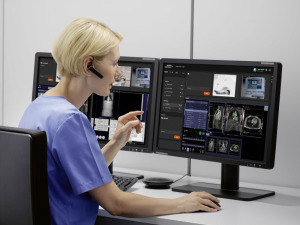por
John R. Fischer, Senior Reporter | January 29, 2024

Siemens Healthineers syngo Virtual Cockpit
Five years after its official unveiling, Siemens Healthineers has gotten the green light from the FDA to sell its syngo Virtual Cockpit communication platform that allows radiologic technologists to guide less experienced colleagues in performing scans.
The software is the first and only multivendor remote scanning tool to score FDA clearance and will allow American rad techs to view scans and image acquisitions in real time for CT, MR, PET, SPECT, PET/CT, SPECT/CT, and PET/MR exams carried out with Siemens Healthineers’ or other manufacturers’ equipment.
Remote technicians virtually connect with on-site ones in real time via headsets, conference speakers, or chat and video functions that allow them to guide those physically present during the exam or take control of the scanner via Siemens’ syngo Expert-i software.
“This FDA clearance means that our customers can use syngo Virtual Cockpit for their remote scanning operations with even more confidence that they are using a proven solution—one that prioritizes patient safety and convenience while also addressing operational and staffing challenges,” said Peter Shen, head of digital and automation at Siemens Healthineers North America, in a statement.
Among the capabilities and advantages accessible with the software are:
- Live audio, video, and chat functionalities
- The ability to be virtually present in and guide three different remote scans simultaneously, regardless of location
- On-the-job staff training at remote facilities for complex scans such as cardiac MR
- Saving patients time spent traveling long distances for exams
- Reducing challenges created by technologist shortages and cut hospital costs
- Standardize and make diagnostic care consistent across multiple facilities
The solution
debuted in 2018 at the Radiological Society of North America Annual Meeting in Chicago and has since been adopted by several providers worldwide.
Most recently, OU Health in Oklahoma
adopted it as part of a 10-year Value Partnership with Siemens Healthineers that also included the first MAGNETOM Terra 7 Tesla MR scanner in the state and plans to build a new imaging research center.
